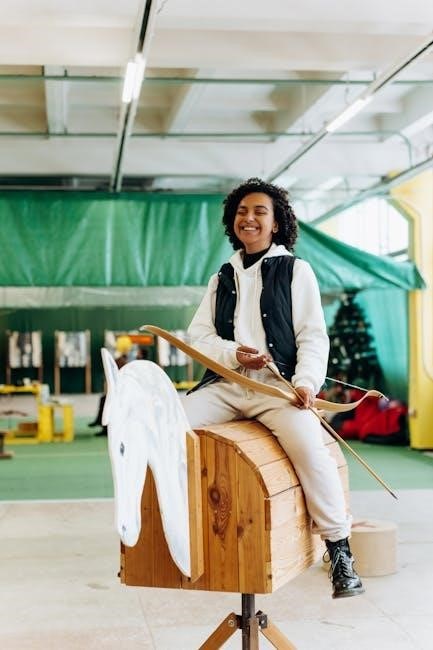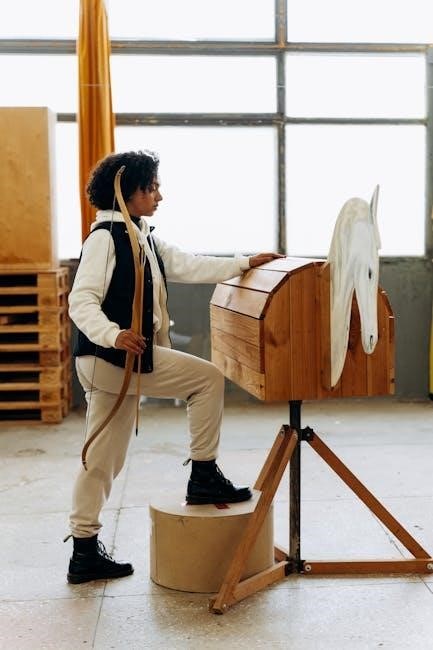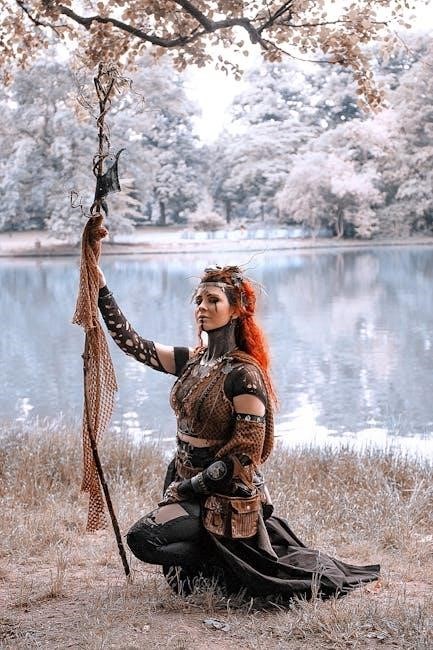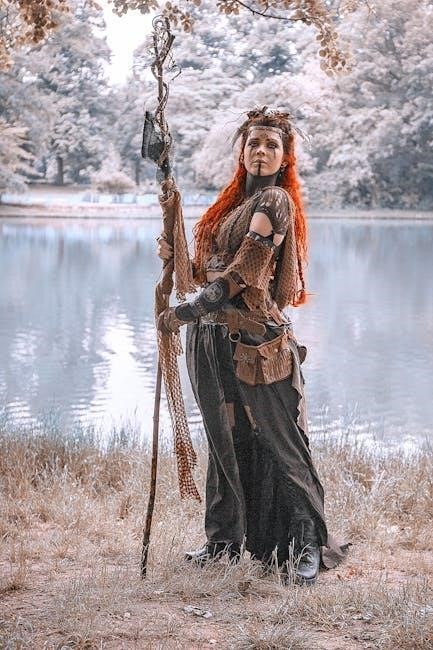Maxine Hong Kingston’s The Woman Warrior: Memoirs of a Girlhood Among Ghosts, published in 1976, blends personal narrative with Chinese folklore, exploring identity and cultural heritage․
Overview of Maxine Hong Kingston’s Work
Maxine Hong Kingston, born in 1940 to Chinese immigrant parents, is a renowned writer and academic․ Her seminal work, The Woman Warrior, blends memoir with Chinese folklore, exploring themes of identity, culture, and gender․ Kingston’s writing often reflects her dual heritage, navigating the tensions between Chinese traditions and American life․ Her work challenges cultural silences and reimagines female experiences․ As a Senior Lecturer at UC Berkeley, Kingston has influenced Asian-American literature profoundly․ Her unique narrative style, blending personal and mythical stories, has earned her critical acclaim and awards, solidifying her legacy as a groundbreaking memoirist and feminist voice․
Historical Context of the Memoir
The Woman Warrior is set against the backdrop of mid-20th-century America, a time of cultural shifts and identity formation for Asian immigrants․ Kingston’s work reflects the experiences of Chinese Americans navigating racial discrimination and assimilation․ The memoir also draws on the historical oppression of women in both Chinese and American societies, highlighting the silencing of female voices․ By weaving personal and collective histories, Kingston addresses the intergenerational trauma and resilience of immigrant families․ Her narrative bridges the gap between past and present, offering a powerful exploration of identity, culture, and gender during a pivotal era in American history․

Themes in “The Woman Warrior”
Central themes include identity, cultural heritage, gender roles, and the intersection of folklore with personal narrative, creating a rich tapestry exploring Asian-American experiences and female empowerment․
Identity and Cultural Heritage
In The Woman Warrior, Maxine Hong Kingston delves into the complexities of identity through her experiences as a Chinese-American woman․ Born to immigrant parents in California, she grapples with the duality of her cultural heritage․ Kingston’s narrative weaves together personal memories with Chinese myths and legends, illustrating the tension between her American upbringing and her ancestral roots․ This interplay highlights the struggle to reconcile conflicting cultural expectations, ultimately shaping her sense of self․ By exploring these themes, Kingston provides a poignant reflection on the immigrant experience and the search for belonging in a multicultural society․
Gender Roles and Female Empowerment
Maxine Hong Kingston’s The Woman Warrior critiques oppressive gender roles in Chinese culture, emphasizing the silencing of women and their limited agency․ Through stories like that of her “no name woman,” Kingston exposes the societal expectations that condemn women to invisibility and shame․ Her narrative challenges these norms, advocating for female empowerment by reclaiming women’s voices and stories․ Kingston’s own journey reflects this struggle, as she navigates the tension between traditional gender roles and her desire for autonomy․ By resisting silence and rewriting women’s histories, Kingston not only empowers herself but also inspires others to challenge patriarchal norms and embrace their identities․

Narrative Structure and Style
Maxine Hong Kingston’s The Woman Warrior employs a non-linear, lyrical style, blending personal memoir with Chinese folklore․ Her use of ghostly imagery and fragmented narratives creates a unique, layered storytelling experience․
Blending of Folklore and Autobiography
In The Woman Warrior, Maxine Hong Kingston seamlessly merges Chinese folklore with her personal experiences, creating a unique narrative voice․ Drawing from myths like Hua Mulan and Fa Mu Lan, Kingston weaves these stories into her memoir to explore themes of identity, culture, and gender․ This blending allows her to connect her American upbringing with her Chinese heritage, offering a rich, layered exploration of self․ By interlacing autobiography with myth, Kingston challenges traditional storytelling boundaries, crafting a work that feels both deeply personal and universally relatable․ This innovative approach not only reflects her cultural duality but also elevates the memoir to a lyrical, hauntingly beautiful form․
Use of Ghosts as a Literary Device
In The Woman Warrior, Maxine Hong Kingston employs ghosts as a powerful literary device, symbolizing unresolved pasts and cultural tensions․ These spectral figures represent silenced voices, lost traditions, and the haunting legacy of patriarchal oppression․ Kingston uses ghosts to bridge her Chinese heritage with her American identity, illustrating how the past lingers in the present․ They embody the “ghosts” of forgotten stories, particularly those of women, whose histories have been erased or marginalized․ Through this imagery, Kingston explores themes of identity, memory, and the immigrant experience, creating a haunting narrative that resonates deeply with readers․ Ghosts thus become a metaphor for the unseen forces shaping her journey․

Reception and Impact
The Woman Warrior received widespread acclaim, winning the National Book Critics Circle Award․ It became a landmark in Asian-American literature, sparking debates on cultural authenticity and identity․
Critical Acclaim and Awards
The Woman Warrior garnered significant critical acclaim, winning the National Book Critics Circle Award for Nonfiction in 1976․ Kingston’s innovative blend of memoir and mythology was praised for its lyrical prose and cultural depth․ The memoir also received the Anisfield-Wolf Book Award, recognizing its contribution to race relations․ Critics celebrated Kingston’s ability to weave personal narrative with Chinese folklore, creating a unique voice for Asian-American experiences․ The book’s success established Kingston as a major figure in American literature, influencing future memoirists and reshaping how identity and culture are explored in writing․ Its impact continues to resonate in academic and literary circles․
Controversies and Cultural Significance
The Woman Warrior sparked debates within Chinese-American communities due to its portrayal of cultural practices and personal family history․ Some critics accused Kingston of romanticizing or misrepresenting Chinese traditions, while others praised her for challenging stereotypes and giving voice to silenced narratives․ The memoir’s cultural significance lies in its exploration of identity, gender, and generational conflict, resonating deeply with readers․ It remains a landmark text in Asian-American literature, fostering dialogue about heritage and belonging․ Kingston’s work continues to be celebrated for its bold storytelling and its impact on contemporary memoir writing, bridging personal and collective histories․

Biographical Insights

Maxine Hong Kingston, born in 1940 in Stockton, California, is a renowned writer and academic․ Her work reflects the experiences of Asian-American women, blending personal and cultural narratives․
Maxine Hong Kingston’s Background
Maxine Hong Kingston, born in 1940 in Stockton, California, is a renowned writer and academic․ Her parents, Chinese immigrants, instilled in her a deep connection to her heritage․ Kingston earned a bachelor’s degree in engineering from the University of California, Berkeley, but later pursued writing․ She is known for blending personal narratives with folklore, as seen in The Woman Warrior․ Kingston is a Senior Lecturer for Creative Writing at UC Berkeley and has written memoirs and fiction, including The Fifth Book of Peace․ Her work often explores identity, cultural heritage, and the Asian-American experience, making her a pivotal voice in contemporary literature․
Personal Influences on Her Writing
Maxine Hong Kingston’s writing is deeply influenced by her Chinese heritage and her experiences as an Asian-American woman․ Her parents, immigrants from China, shared stories of folklore and family history, which she wove into her work․ Kingston’s unique voice stems from navigating cultural duality, blending traditional tales with personal narrative․ Her academic background in engineering and later in writing also shaped her approach․ Kingston’s role as a Senior Lecturer at UC Berkeley further enriched her perspective, allowing her to explore themes of identity and cultural intersection․ These influences collectively contributed to her innovative storytelling style, making her a leading figure in Asian-American literature․

Cultural and Literary Legacy
Maxine Hong Kingston’s The Woman Warrior revolutionized Asian-American literature, blending folklore and memoir to explore identity, culture, and gender, inspiring future writers with its innovative style and depth․
Contribution to Asian-American Literature
Maxine Hong Kingston’s The Woman Warrior is a landmark work in Asian-American literature, offering a powerful voice to the experiences of Chinese-American women․ Published in 1976, it filled a void by blending personal narrative with Chinese folklore, creating a unique storytelling style․ Kingston’s exploration of identity, cultural heritage, and gender roles resonated deeply, inspiring future generations of Asian-American writers․ Her work challenged stereotypes and brought attention to the complexities of immigrant experiences․ By weaving autobiography with myth, Kingston not only preserved her cultural legacy but also redefined the boundaries of memoir writing, leaving a lasting impact on the genre․
Influence on Modern Memoir Writing
Maxine Hong Kingston’s The Woman Warrior revolutionized memoir writing by blending personal narrative with folklore, mythology, and cultural critique․ Her innovative style, which mixes autobiography with fictional elements, has inspired writers to experiment with non-traditional storytelling․ Kingston’s exploration of identity, memory, and trauma set a new standard for vulnerability and creativity in memoirs․ Her work encouraged writers to incorporate cultural and historical contexts, enriching the genre․ By challenging traditional boundaries, Kingston’s influence is evident in contemporary memoirs that blend personal and collective histories, making her a pioneer in modern literary expression․

No Responses